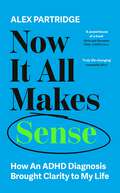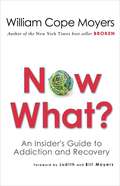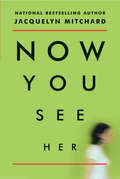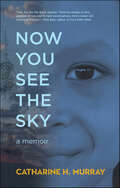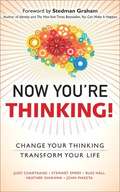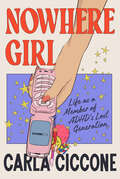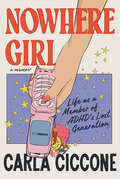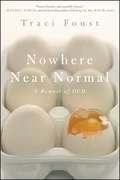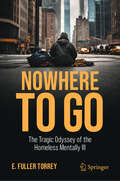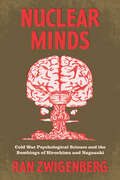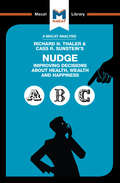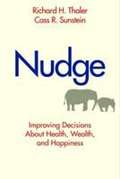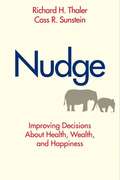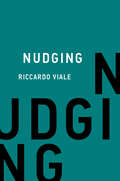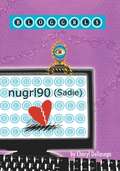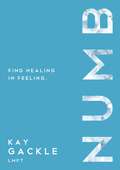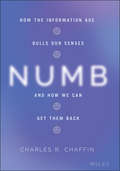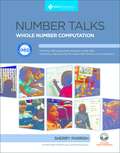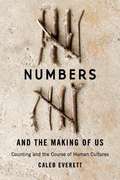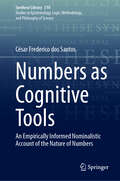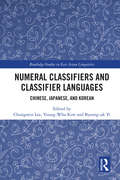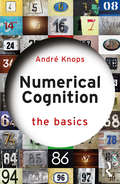- Table View
- List View
Now It All Makes Sense - How An ADHD Diagnosis Changed My Life: The Sunday Times Bestseller from the Founder of LadBible and UniLad
by Alex PartridgeTHE INSTANT SUNDAY TIMES BESTSELLER'The most well-written and validating book on ADHD that I have ever read' Reader review ⭐⭐⭐⭐⭐'Wow! What an incredible insight into the life of ADHD!' Reader review ⭐⭐⭐⭐⭐ 'Insightful and compassionate. This will help a lot of people' Matt Haig'One of the most complete and moving accounts I've ever read... On behalf of all of us who grope toward understanding, thank you, Mr Partridge; thank you, thank you, thank you.' Edward Hallowell, MD'Alex is rich, successful and an entertaining and concise communicator. Alex is also very ADHD. You want to read this book for all these reasons. It helps that it is short.' Kate Spicer'Truly life changing. The perfect antidote for shame' Samantha Hiew PhD, founder of ADHD Girls'A powerhouse of a book. Deeply validating' Rich and Roxanne Pink (ADHD Love)'Thank you, Alex, for making us feel seen, heard and celebrated!' Martine McCutcheonFROM THE HOST OF THE GLOBALLY ACCLAIMED 'ADHD CHATTER' PODCASTAged just 21, Alex Partridge founded UNILAD and LADBible, social news sites which now have a following of 100 million people around the globe. A legal case over ownership in 2017 tipped him over the edge of the cliff into alcoholism, triggering years of mental health issues until, aged 34, he was diagnosed with ADHD.Now it all makes sense.In his chart-topping podcast, ADHD Chatter, Alex has spoken to dozens of experts on ADHD and related conditions in a bid to understand and improve outcomes for the neurodiverse population - and this groundbreaking book brings them all together, for the first time, in one place.A blend of lived experience and expert insight, this deep dive into ADHD has the power to change your life. If you've ever wondered why you can't remember those critical appointments, how you can be hyper-focused one minute and down a YouTube rabbit-hole 30 seconds later, or why do people walk so slowly? then this relatable and unashamedly honest book is for you.Written with Alex's trademark raw vulnerability, Now It All Makes Sense distils the essence of all the most important need-to-knows, from parenting with (and for) ADHD, to managing your mental health, your finances and even your shopping list. Most importantly it celebrates the opportunities and strengths, unique skillsets and positive traits of ADHD to remind you that you are NOT broken - and you are enough.
Now It All Makes Sense - How An ADHD Diagnosis Changed My Life: The Sunday Times Bestseller from the Founder of LadBible and UniLad
by Alex PartridgeTHE INSTANT SUNDAY TIMES BESTSELLER'The most well-written and validating book on ADHD that I have ever read' Reader review ⭐⭐⭐⭐⭐'Wow! What an incredible insight into the life of ADHD!' Reader review ⭐⭐⭐⭐⭐ 'Insightful and compassionate. This will help a lot of people' Matt Haig'One of the most complete and moving accounts I've ever read... On behalf of all of us who grope toward understanding, thank you, Mr Partridge; thank you, thank you, thank you.' Edward Hallowell, MD'Alex is rich, successful and an entertaining and concise communicator. Alex is also very ADHD. You want to read this book for all these reasons. It helps that it is short.' Kate Spicer'Truly life changing. The perfect antidote for shame' Samantha Hiew PhD, founder of ADHD Girls'A powerhouse of a book. Deeply validating' Rich and Roxanne Pink (ADHD Love)'Thank you, Alex, for making us feel seen, heard and celebrated!' Martine McCutcheonFROM THE HOST OF THE GLOBALLY ACCLAIMED 'ADHD CHATTER' PODCASTAged just 21, Alex Partridge founded UNILAD and LADBible, social news sites which now have a following of 100 million people around the globe. A legal case over ownership in 2017 tipped him over the edge of the cliff into alcoholism, triggering years of mental health issues until, aged 34, he was diagnosed with ADHD.Now it all makes sense.In his chart-topping podcast, ADHD Chatter, Alex has spoken to dozens of experts on ADHD and related conditions in a bid to understand and improve outcomes for the neurodiverse population - and this groundbreaking book brings them all together, for the first time, in one place.A blend of lived experience and expert insight, this deep dive into ADHD has the power to change your life. If you've ever wondered why you can't remember those critical appointments, how you can be hyper-focused one minute and down a YouTube rabbit-hole 30 seconds later, or why do people walk so slowly? then this relatable and unashamedly honest book is for you.Written with Alex's trademark raw vulnerability, Now It All Makes Sense distils the essence of all the most important need-to-knows, from parenting with (and for) ADHD, to managing your mental health, your finances and even your shopping list. Most importantly it celebrates the opportunities and strengths, unique skillsets and positive traits of ADHD to remind you that you are NOT broken - and you are enough.
Now What?: An Insider's Guide to Addiction and Recovery
by William Cope MoyersAddiction and recovery insider and expert William Cope Moyers answers the question "Now What?" for addicts and their loved ones, every step of their journey from contemplation through intervention, treatment, and recovery.Addiction and recovery insider and expert William Cope Moyers answers the question “Now what?” for addicts and their loved ones along every step of their journey through contemplation, intervention, treatment, and recovery.As the survivor of multiple relapses and near-fatal experiences with his addiction to alcohol and other drugs, William Cope Moyers knows what it’s like to desperately need, but not know how to find, a good treatment program. As Moyers was struggling, his parents--television journalist Bill Moyers and his wife, Judith--were also battling to understand what was happening to their son and what to do about it. Thanks to a successful intervention, intensive inpatient treatment, and a rigorous Twelve Step program, Moyers has been clean and sober since 1994, and has devoted his life to guiding others in getting the help they need.In the course of his work as a recovery advocate and ambassador with Hazelden Foundation, Moyers has talked with hundreds of alcoholics, addicts, and their families and has been a lifeline in helping them get the treatment they need. Drawing from both his own journey and the experiences of those he’s helped, Moyers applies his passion and trademark down-to-earth, style to lead readers through the process ofrecognizing when someone needs help,finding a quality treatment program,navigating the treatment process, andestablishing a support system after treatment.
Now You See Her
by Jacquelyn MitchardFor Hope Shay the entire world is a stage. Really. Acting has been her dream for as long as she can remember. She will do anything, anything, to get a leading role. Okay, maybe faking her own abduction was extreme. But a true actress suffers for her art. And Hope is a born actress if ever there was one.
Now You See Her
by Jacquelyn MitchardFor Hope Shay the entire world is a stage. Really.Acting has been her dream for as long as she can remember. She will do anything, anything, to get a leading role. Okay, maybe faking her own abduction was extreme. But a true actress suffers for her art. And Hope is a born actress if ever there was one.
Now You See the Sky: A Memoir
by Catharine H. MurrayThis memoir — the first release on best-selling author Ann Hood’s Gracie Belle imprint — about the fathomless loss of a beloved child reveals how tragedy can transform us and make us more fully alive.“Murray’s lucid meditations and living-in-the-moment attitude — e.g., providing simple pleasures like a favorite food to a sick child — serve as useful reminders to all of us that life is precious and fleeting and must be enjoyed to the fullest. It’s a simple message but an important one. As much a eulogy to Chan as a testament to the joy of life, the book is a heartwarming tale of dealing with life-altering loss . . . A tender, love-filled story of how one woman dealt with the loss of a young child.” —Kirkus Reviews “An extraordinary memoir. Forthright, honest and haunting . . . Murray’s memoir is wise and enlightened.” —Portland Press HeraldNow You See the Sky is a memoir about love, motherhood, and loss. When Catharine H. Murray travels to a small town on the banks of the Mekong River to work at a refugee camp, she falls in love and marries a local man with whom she has three sons. When their middle son is diagnosed with cancer at age five, their pursuit of a cure takes them from Thailand to Seattle, before they eventually return to Thailand, settling on a remote mountaintop. Full of honesty and grace, Now You See the Sky — the debut selection in Ann Hood’s new Gracie Belle imprint — allows the reader to witness the fathomless loss of a child and learn how tragedy can transform us, expand our vision, and make us more fully alive.Now You See the Sky is the debut selection of Ann Hood’s new nonfiction imprint with Akashic, Gracie Belle. Modeled after her experience writing the memoir Comfort: A Journey Through Grief, and named after her daughter, Grace, Hood’s imprint reaffirms for authors and readers that none of us is alone in our journeys.
Now You're Thinking: Change Your Thinking, Transform Your Life
by Russ Hall Judy M. Chartrand Stewart Emery Heather Ishikawa John MaketaThe author stresses the power of thought and emphasises that if we change the way we think to support the experiences and success that matter to us, our life will be transformed.
Nowhere Girl: Life as a Member of ADHD's Lost Generation
by Carla CicconeWhy is a generation of women only now discovering they have ADHD? (Spoiler: misogyny.) A writer examines the cost of living with undiagnosed ADHD in this reported memoir about the girls medical science ignored.When Carla Ciccone is diagnosed with ADHD at thirty-nine—an evaluation prompted by the demands of early motherhood—it flips the script on her life. After years of self-blame and self-sabotage, she discovers that her most reviled traits aren&’t deep personality flaws, but symptoms of an undiagnosed disorder. And as she goes from being her own biggest hater to someone a bit more compassionate, she notices the growing community of women in the same situation.Weaving her personal story into an investigation of the rise in ADHD diagnoses, Ciccone draws on scientific research and expert interviews to reflect on the classrooms of the 1990s, where &“ADD&” was reserved for hyperactive white boys, and girls learned to mask their differences. She examines the hormonal upheavals of adolescence and their unique effects on neurochemistry, and later charts her chaotic entry into motherhood. She also explores the history of women&’s mental healthcare and the pressure to perform our gender in a certain way. Throughout, Ciccone seeks to understand the ramifications of an ignored mental disorder for an entire generation of women—the nowhere girls.With humor, depth, and detailed reporting, Nowhere Girl explores the cultural impact of ADHD on girls and women, and offers a path forward to reclaim our narratives, forgive ourselves, and parent our children (and reparent ourselves) with the softness we never received.
Nowhere Girl: Life as a Member of ADHD's Lost Generation
by Carla CicconeWhy is a generation of women only now discovering they have ADHD? (Spoiler: misogyny). A writer examines the cost of living with undiagnosed ADHD in a reported memoir about the girls that medical science ignored.When Carla Ciccone is diagnosed with ADHD at thirty-nine—an event brought on by the demands of early motherhood—it flips the script on the story of her life. After years of self-blame and sabotage, it turns out that her most reviled traits aren&’t deep personality flaws, but symptoms of an undiagnosed disorder. And as she goes from being her own biggest hater to something a bit more compassionate, she notices the growing community of women in the same situation.Weaving her personal story into a broader investigation of the rise in ADHD diagnoses, Carla draws on scientific research and expert interviews as she looks back on the classrooms of the 1990s, where &“ADD&” was reserved for hyperactive white boys and the girls learned to mask their differences. She examines the hormonal upheavals of adolescence and their unique effects on neurochemistry and later charts her chaotic entrance into motherhood. She also reflects on the history of women&’s mental healthcare and the pressure put on us to perform our genders in a certain way. Throughout, Carla seeks to understand the ramifications of an ignored mental disorder on an entire generation—the nowhere girls.With humor, depth and detailed reporting, Nowhere Girl explores the cultural impact of ADHD on girls and women and offers a path forward for reclaiming our narratives, forgiving ourselves and parenting our children (and reparenting ourselves) with the softness we didn&’t receive.
Nowhere Near Normal
by Traci FoustIn the bestselling tradition of Augusten Burroughs, a compassionate, witty, and completely candid memoir that chronicles growing up with obsessive-compulsive disorder. When all the neighborhood kids were playing outdoors, seven-year-old Traci Foust was inside making sure the miniature Catholic saint statues on her windowsill always pointed north, scratching out bald patches on her scalp, and snapping her fingers after every utterance of the word God. As Traci grew older, her OCD blossomed to include panic attacks and bizarre behaviors, including a fear of the sun, an obsession with contracting eradicated diseases, and the idea that she could catch herself on fire just by thinking about it. While stints of therapy -- and lots of Nyquil -- sometimes helped, nothing alleviated the fact that her single mother and mid-life crisis father had no idea how to deal with her. Traci Foust shares her wacky and compelling journey with brutal honesty, from becoming a teenage runaway on the poetry slam beat in the hippie beach towns of Northern California to living at a family-owned nursing home, in a room with a seventy-five- year-old WWII Vet who kept mistaking her for a prostitute. In this funny, frenetic, and wonderfully dark-humored account of her struggles with a variety of psychological disorders, Traci ultimately concludes that there is nothing special about being "normal."
Nowhere to Go: The Tragic Odyssey of the Homeless Mentally Ill
by E. Fuller TorreyThis open access book attempts to answer the question, “Why are so many severely mentally ill people homeless or incarcerated?” Updated since it’s original 1988 release, this book tracks the history of this question in the United States. The answer begins in 1955, when the United States deinstitutionalized the 559,000 patients who were in state mental hospitals. Today, only 35,000 remain. In 1963, Congress funded President Kennedy’s proposed federally funded Community Mental Health Centers (CMHCs), whose main purpose was to provide care for the patients being released from the hospitals. However, most of the CMHCs never did so, but rather became counseling centers for individuals with less serious mental illnesses. The lack of psychiatric aftercare for severely mentally ill individuals resulted in more than 200,000 of them who are homeless and more than 250,000 others who are in jails and prisons. This story also includes little known details such as the role played by conscientious objectors who worked in the state hospitals during WWII; Rosemary Kennedy’s psychosis; the influence of the conservative John Birch society on Presidents Nixon and Reagan; and mental health myths incorrectly attributed to Reagan. Finally, the book discusses what needs to be done to improve the mental illness treatment system. This is an ideal guide for psychiatrists, psychologists, and members of the public who are concerned about homelessness.
Nuclear Minds: Cold War Psychological Science and the Bombings of Hiroshima and Nagasaki
by Ran ZwigenbergHow researchers understood the atomic bomb’s effects on the human psyche before the recognition of Post-Traumatic Stress Disorder. In 1945, researchers on a mission to Hiroshima with the United States Strategic Bombing Survey canvassed survivors of the nuclear attack. This marked the beginning of global efforts—by psychiatrists, psychologists, and other social scientists—to tackle the complex ways in which human minds were affected by the advent of the nuclear age. A trans-Pacific research network emerged that produced massive amounts of data about the dropping of the bomb and subsequent nuclear tests in and around the Pacific rim. Ran Zwigenberg traces these efforts and the ways they were interpreted differently across communities of researchers and victims. He explores how the bomb’s psychological impact on survivors was understood before we had the concept of post-traumatic stress disorder. In fact, psychological and psychiatric research on Hiroshima and Nagasaki rarely referred to trauma or similar categories. Instead, institutional and political constraints—most notably the psychological sciences’ entanglement with Cold War science—led researchers to concentrate on short-term damage and somatic reactions or even, in some cases, on denial of victims’ suffering. As a result, very few doctors tried to ameliorate suffering. But, Zwigenberg argues, it was not only that doctors “failed” to issue the right diagnosis; the victims’ experiences also did not necessarily conform to our contemporary expectations. As he shows, the category of trauma should not be used uncritically in a non-Western context. Consequently, this book sets out, first, to understand the historical, cultural, and scientific constraints in which researchers and victims were acting and, second, to explore how suffering was understood in different cultural contexts before PTSD was a category of analysis.
Nuclear Minds: Cold War Psychological Science and the Bombings of Hiroshima and Nagasaki
by Ran ZwigenbergHow researchers understood the atomic bomb’s effects on the human psyche before the recognition of Post-Traumatic Stress Disorder. In 1945, researchers on a mission to Hiroshima with the United States Strategic Bombing Survey canvassed survivors of the nuclear attack. This marked the beginning of global efforts—by psychiatrists, psychologists, and other social scientists—to tackle the complex ways in which human minds were affected by the advent of the nuclear age. A trans-Pacific research network emerged that produced massive amounts of data about the dropping of the bomb and subsequent nuclear tests in and around the Pacific rim. Ran Zwigenberg traces these efforts and the ways they were interpreted differently across communities of researchers and victims. He explores how the bomb’s psychological impact on survivors was understood before we had the concept of post-traumatic stress disorder. In fact, psychological and psychiatric research on Hiroshima and Nagasaki rarely referred to trauma or similar categories. Instead, institutional and political constraints—most notably the psychological sciences’ entanglement with Cold War science—led researchers to concentrate on short-term damage and somatic reactions or even, in some cases, on denial of victims’ suffering. As a result, very few doctors tried to ameliorate suffering. But, Zwigenberg argues, it was not only that doctors “failed” to issue the right diagnosis; the victims’ experiences also did not necessarily conform to our contemporary expectations. As he shows, the category of trauma should not be used uncritically in a non-Western context. Consequently, this book sets out, first, to understand the historical, cultural, and scientific constraints in which researchers and victims were acting and, second, to explore how suffering was understood in different cultural contexts before PTSD was a category of analysis.
Nudge: Improving Decisions About Health, Wealth and Happiness
by Mark EganWhen it was published in 2008, Richard Thaler and Cass Sunstein’s Nudge: Improving Decisions about Health, Wealth, and Happiness quickly became one of the most influential books in modern economics and politics. Within a short time, it had inspired whole government departments in the US and UK, and others as far afield as Singapore. One of the keys to Nudge’s success is Thaler and Sunstein’s ability to create a detailed and persuasive case for their take on economic decision-making. Nudge is not a book packed with original findings or data; instead it is a careful and systematic synthesis of decades of research into behavioral economics. The discipline challenges much conventional economic thought – which works on the basis that, overall, humans make rational decisions – by focusing instead on the ‘irrational’ cognitive biases that affect our decision making. These seemingly in-built biases mean that certain kinds of economic decision-making are predictably irrational. Thaler and Sunstein prove themselves experts at creating persuasive arguments and dealing effectively with counter-arguments. They conclude that if governments understand these cognitive biases, they can ‘nudge’ us into making better decisions for ourselves. Entertaining as well as smart, Nudge shows the full range of reasoning skills that go into making a persuasive argument.
Nudge: Improving Decisions About Health, Wealth, And Happiness
by Cass R. Sunstein Richard H. ThalerEvery day, we make decisions on topics ranging from personal investments to schools for our children to the meals we eat to the causes we champion. Unfortunately, we often choose poorly. The reason, the authors explain, is that, being human, we all are susceptible to various biases that can lead us to blunder. Our mistakes make us poorer and less healthy; we often make bad decisions involving education, personal finance, health care, mortgages and credit cards, the family, and even the planet itself. Thaler and Sunstein invite us to enter an alternative world, one that takes our humanness as a given. They show that by knowing how people think, we can design choice environments that make it easier for people to choose what is best for themselves, their families, and their society. Using colorful examples from the most important aspects of life, Thaler and Sunstein demonstrate how thoughtful "choice architecture" can be established to nudge us in beneficial directions without restricting freedom of choice.
Nudge: Improving Decisions About Health, Wealth, and Happiness
by Cass R. Sunstein Richard H. ThalerEvery day, we make decisions on topics ranging from personal investments to schools for our children to the meals we eat to the causes we champion. Unfortunately, we often choose poorly. The reason, the authors explain, is that, being human, we all are susceptible to various biases that can lead us to blunder. Our mistakes make us poorer and less healthy; we often make bad decisions involving education, personal finance, health care, mortgages and credit cards, the family, and even the planet itself. Thaler and Sunstein invite the listener to enter an alternative world, one that takes our humanness as a given. They show that by knowing how people think, we can design choice environments that make it easier for people to choose what is best for themselves, their families, and their society. Using colorful examples from the most important aspects of life, Thaler and Sunstein demonstrate how thoughtful "choice architecture" can be established to nudge us in beneficial directions without restricting freedom of choice. Nudgeoffers a unique new take-from neither the left nor the right-on many hot-button issues, for individuals and governments alike. This is one of the most engaging and provocative audio books to come along in many years.
Nudging
by Riccardo VialeHow &“nudges&” by government can empower citizens without manipulating their preferences or exploiting their biases.We&’re all familiar with the idea of &“nudging&”—using behavioral mechanisms to encourage people to make certain choices—popularized by Richard Thaler and Cass Sunstein in their bestselling 2008 book Nudge. This approach, also known as &“libertarian paternalism,&” goes beyond typical programs that simply provide information and incentives; nudges can range from automatic enrollment in a pension plan to flu-shot scheduling. In Nudging, Riccardo Viale explores the evolution of nudging and proposes new approaches that would empower citizens without manipulating them paternalistically. He shows that we can use the tools of the behavioral sciences without abandoning the principle of conscious decision-making. Viale discusses the work of Herbert Simon, Gerd Gigerenzer, Daniel Kahneman, and Amos Tversky that laid the foundation of behavioral economics, describes how policy makers have sought to help people avoid bad decisions, offers examples of effective nudging, and considers how to nudge the nudgers. How can we tell good nudges from bad nudges? Viale explains that good nudges help us avoid bias and encourage deliberate decision making; bad nudges, on the other hand, use bias to nudge people unconsciously into unintentional behaviors. Bad nudges attempt to compel decisions based on economic rationality. Good nudges encourage decisions based on a pragmatic, adaptive, ecological kind of rationality. Policy makers should take note.
Nugrl90 (Sadie)
by Cheryl DellasegaSadie, a.k.a. nugrl90, finds out that her parents are really, truly getting divorced, but now her family is moving! She has to start the school year as the new girl. So Sadie creates a blog to sort out every new W3TP (What's Wrong With This Picture?) in her life.
Numb: Find Healing In Feeling
by Kay GackleI feel numb.Kay Gackle has heard these words for years as a therapist. Then one day, Kay found she was saying these exact same words.The phrase feeling numb is a bit ironic. Is it a feeling if we "feel" nothing? Being numb can be considered a feeling the same as white is considered a color. The color white appears because it absorbs no color. White is literally the absence of color. In the same way, numb is the absence of feeling. The color white can be seen when it is against a background of other colors. Likewise, we recognize being numb against the knowledge of where other feelings would typically exist. We know that we would naturally feel in a certain way, but we just don't feel anything.In this book, we identify what being numb looks like in everyday life, how we get numb, and the problems and symptoms surrounding it. Not stopping there, we will journey together into a deeper understanding of feelings and begin to let ourselves feel again. Through other’s stories, engaging questions, and practical tools, we can find healing and move beyond being numb.
Numb: How the Information Age Dulls Our Senses and How We Can Get them Back
by Charles R. ChaffinDiscover how to manage this noisy world without it managing you. In Numb, distinguished author Dr. Charles R. Chaffin delivers a fun and evidence-based exploration of how you can devote more attention on what you believe is important while ignoring the distractions that increasingly permeate your life. Using research from cognitive, education, positive, and clinical psychology, the book identifies the sources of noise and distraction in this information age and how we can manage it in all aspects of our lives. You'll learn about: How experiences in technology, from social media to selfies to porn, impact our ability to engage and connect with others The news we consume and the impact of confirmation bias, filter bubbles, and tribalism How FOMO and choice overload impact our decision-making The power of our attention in all aspects of our daily lives Perfect for anyone interested in the expanding impact of the information age on our collective psyche, ;Numb helps empower you to use technology and information not as a destination, but as a tool towards authenticity and empowerment.
Number Talks, Grades K-5: Helping Children Build Mental Math and Computation Strategies
by Sherry ParrishNumber Talks A five- to fifteen-minute classroom conversation around purposefully crafted computation problems that are solved mentally. The best part of a teacher's day. This dynamic multimedia resource was created in response to the requests of teachers--those who want to implement number talks but are unsure of how to begin and those with experience who want more guidance in crafting purposeful problems. It supports teachers in understanding: what a classroom talk is; how to follow students' thinking and pose the right questions to build understanding; how to prepare for and design purposeful number talks; and how to develop grade-level-specific strategies for the operations of addition, subtraction, multiplication, and division. Number Talks supports the Common Core State Standards for Mathematics.
Numbers and the Making of Us: Counting and the Course of Human Cultures
by Caleb EverettNumber concepts are a human invention developed and refined over millennia. They allow us to grasp quantities precisely: recent research shows that most specific quantities are not perceived in the absence of a number system. Numbers are not innate or universal; yet without them, the world as we know it would not exist.
Numbers as Cognitive Tools: An Empirically Informed Nominalistic Account of the Nature of Numbers (Synthese Library #510)
by César Frederico dos SantosThis books offers a novel account of the nature of numbers firmly grounded in results from numerical cognition and the philosophy of mathematics. Drawing on empirical data on the human experience of what we call “numbers,” the author shows that numbers do not exist as abstract objects, but that the idea that they do is a useful cognitive tool. Contrary to the platonist view, according to which arithmetic is true of a realm of abstract entities, the nominalistic account presented in this book shows arithmetic to be true of descriptions of structural properties of techniques such as counting and calculating procedures. This book is of interest to both philosophers and cognitive scientists who want to have a deeper understanding of what numbers are.
Numeral Classifiers and Classifier Languages: Chinese, Japanese, and Korean (Routledge Studies in East Asian Linguistics)
by Chungmin Lee; Young-Wha Kim; Byeong-uk YiFocusing mainly on classifiers, Numeral Classifiers and Classifier Languages offers a deep investigation of three major classifier languages: Chinese, Japanese, and Korean. This book provides detailed discussions well supported by empirical evidence and corpus analyses. Theoretical hypotheses regarding differences and commonalities between numeral classifier languages and other mainly article languages are tested to seek universals or typological characteristics. The essays collected here from leading scholars in different fields promise to be greatly significant in the field of linguistics for several reasons. First, it targets three representative classifier languages in Asia. It also provides critical clues and suggests solutions to syntactic, semantic, psychological, and philosophical issues about classifier constructions. Finally, it addresses ensuing debates that may arise in the field of linguistics in general and neighboring inter-disciplinary areas. This book should be of great interest to advanced students and scholars of East Asian languages.
Numerical Cognition (The Basics)
by Andre KnopsNumerical Cognition: The Basics provides an understanding of the neural and cognitive mechanisms that enable us to perceive, process, and memorize numerical information. Starting from basic numerical competencies that humans share with other species, the book explores the mental coding of numbers and their neural representation. It explains the strategies of mental calculation, their pitfalls and their development, as well as the developmental steps children make while learning about numbers. The book gradually builds our understanding of the underlying mental processes of numeracy and concludes with an insightful examination of the diagnosis, etiology and treatment of dyscalculia. Written in an accessible manner, the book summarizes and critically evaluates the major psychological explanations for various empirical phenomena in numerical cognition. Containing a wealth of student-friendly features including end of chapter summaries, informative figures, further reading lists, and links to relevant websites, Numerical Cognition: The Basics is an essential starting point for anybody new to the field.
